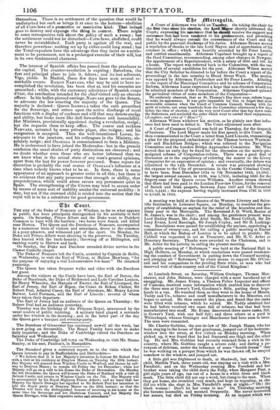The interest of Spanish affairs has passed from the provinces
to the capital. The counter-revolution is expiring : Barcelona, the first and principal place to join it, falters; and its last adherent, Vigo, yields. In Madrid, these few days have seen several re- markable events. RAMON NAEVAEZ, who may be said to have ac- complished the revolution, has been shot at, and his assassins are unscathed ; while, with the customary adroitness of Spanish coups d'fitat, the retribution intended for the chief visited only an obscure officer. In his bullet-pierced carriage, NARVAEZ goes to the Senate, to advocate the law enacting the majority of the Queen. The majority is declared : Queen ISABELLA takes the oath prescribed for the Sovereign, and enters upon the active discharge of royal functions with a display of coolness and will that may denote energy and ability, but looks more like dull forwardness and insensibility. Her Ministers, provisionally appointed during a revolution, resign ; but she requests them to keep office. The coarse and reckless NARVAEZ, actuated by some private pique, also resigns ; and his resignation is accepted. Then the well-intentioned LOPEZ, in- adequate to the juncture, and his colleagues in the Ministry, ab- solutely resign ; and OLOZAGA is commissioned to form a Ministry. He is understood to have joined the Moderados : but in the present confusion the usual shades of party distinctions are obscured ; and we doubt whether even those who are better informed than we are know what is the actual state of any man's general opinions, apart from the lust for power however procured. Some repute for discretion is probably the real source of OLOZAGA'S influence at a time when nobody knows what to be at. In form, there is some appearance of an approach to greater order in all this ; but there is no evidence that any party possesses that strength or ability, that preponderance, which could alone secure any permanent quiet in Spain. The strengthening of the Crown may tend to secure order by means of some sort of stability amidst the universal mobility : it may, but not if the crowned child is misled into the notion that the royal will is to be a substitute for good government.


























 Previous page
Previous page